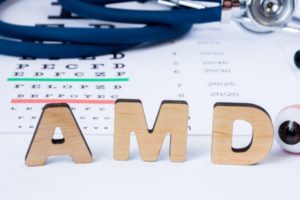AGE-RELATED MACULAR DEGENERATION EARLY DETECTION
 February is National Age-Related Macular Degeneration (AMD) awareness month. We want to make sure that you know what side effects to be on the lookout for. While there is not a cure for Macular Degeneration early detection is key to slowing down vision loss and keeping your sight.
February is National Age-Related Macular Degeneration (AMD) awareness month. We want to make sure that you know what side effects to be on the lookout for. While there is not a cure for Macular Degeneration early detection is key to slowing down vision loss and keeping your sight.
Macular degeneration is one of the leading causes of vision loss. It is caused by the deterioration of the central portion of the retina. The central portion of the retina, known as the macula, is responsible for focusing vision for your eye, allowing us to read, recognize faces or colors, drive and do many day-to-day activities.
While there is no cure for this disease, there are treatments to help slow it down. It is important to maintain yearly eye exams for early detection. AMD is very difficult to notice until you have already lost a large portion of your vision.
Bissell Eye Care utilized Optical Coherence Tomography (OCT) is a non-invasive, office-based imaging test that uses a special light to scan the macula and determine whether there is fluid in the macula, potentially signifying wet AMD.
Lifestyle changes can help lower your risk of developing AMD. Some lifestyle changes might include proper exercise and diet, avoiding smoking, and protecting your eyes from the UV rays of the sun. People that run a higher risk of developing AMD are people who have a family history and race. Caucasians are more likely to develop the disease than African American or Hispanic heritage, and smokers.
There are three stages of AMD:
- Early AMD: At this stage most people do not experience vision loss. The presence of medium-sized drusen (yellow deposits beneath the retina), is usually an early sign you eye doctor looks for.
- Intermediate AMD: This is where vision loss may start to be noticed, however it may not be enough to be noticeable. Specific tests will look for pigment changes in the retina and larger drusen deposits.
- Late AMD: At this stage vision loss has become noticeable.
There are some new medications available that can help slow the progression of wet AMD.
Remember that early detection and treatment is key to help save your vision. Be sure to tell your eye doctor if anyone in your family has or had Macular Degeneration. Take charge of your health and see clearly with routine eye exams.
About the author: John D. Bissell, owner of Bissell Eye Care and Tri-State Low Vision Services, offers comprehensive eye examinations for the entire family, ocular disease detection and treatment, eye glasses, sun glasses, active wear, contact lenses, and low vision examinations for those with significant vision loss. He has undergone specialized training for treatment of low vision by the International Academy of Low Vision Specialists utilizing customized telescopic eyeglasses, prisms and telescopic implants for patients who qualify. The practice accepts most types of vision and health insurance plans.
